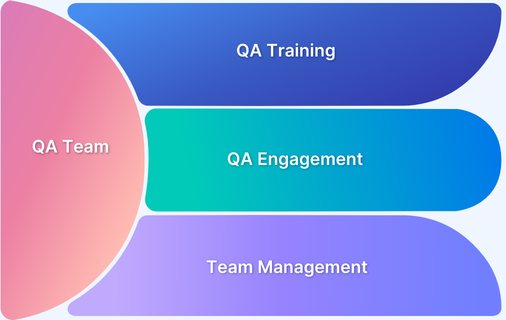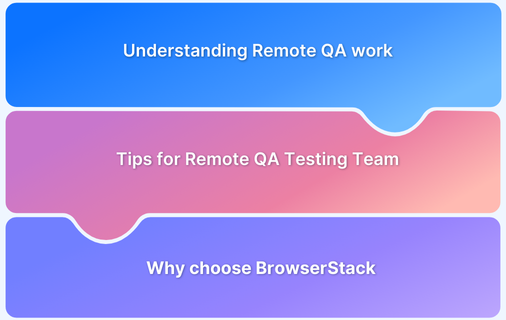Being a QA manager is one of the most sought-after roles in the IT industry. QA manager skills are at the forefront of everything testing-related. Handling a big team of employees who possess different qualities in the best way possible is not child’s play. It is a complex job to bring the whole team to overcome agile testing challenges. It requires a great presence of mind and correct decision-making capabilities.
Along with the responsibility of getting along with the team, one needs to have an amiable environment where there is healthy competition. This should, by no means, affect the project deadline.
Must-Read: How to fit QA into a DevOps setup
All these QA manager skills should include a mix of technical and non-technical skills. Finding a QA manager with both sets of skills is extremely difficult. But what are these skills, and what are they all about? Let’s delve deeper to understand those skillsets.
What does a QA Manager Do?
QA Manager or Quality Assurance Manager is a key driver in any product development team. This particular individual sits above the product team in the organizational structure and is responsible for ensuring the quality of software/product releases. Moreover, they are often the point of contact (POC) between the client and the product team.
In the current scenario, where the market is highly competitive, a competent QA Manager can help a company to attain success swiftly and avoid pitfalls.
If you are wondering how to become a good QA manager, here are some skills that can set you apart from others.
1. Effective Communication
A QA manager should be able to give the right idea and also be able to comprehend the message that is sent to them. They should possess practical written and verbal communication skills.
Moreover, the QA manager must convey how much product development is left to higher management. When the product is developed and brought for quality check, they should clearly communicate whether the product makes the cut or not.
QA managers are also responsible for team meetings. They should be able to understand the gist of the topics discussed in the meeting to deliver the report to the higher management.
2. Strong Programming Skills
A QA manager should be aware of the programming languages used in the market. They should also know what the client requires to guide the team on this. Additionally, they should be aware of automation tools to ease the burden and save time for the team to focus on vital areas of the code’s feasibility.
Follow-Up Read: Essential Metrics for the QA Process
What programming languages should a QA manager know? That depends on the requirements of the organization. If you are working with React or node, you need to know JavaScript as well. If you are coding in Java or Python, you should also know about Springboot and Django.
But the programming language that is extremely important for a QA manager is SQL. Knowing Ruby and Perl could also be a better choice for the future.
 3. Efficient Time Management
3. Efficient Time Management
Among the various QA manager skills, time management is highly needed. You need to have the necessary efficiency in delivering the promised product. If you fail to deliver on time, the entire team will be blamed, with you at the forefront.
Even though efficient project management tools like Asana or Jira help the team collaborate and pace the project delivery, you as the lead need the correct time management skills to help your team perform better.
4. Pinpointed Data Visualization
As a QA manager, you must be able to visualize data for better debugging in advance. They must be able to have an idea of the specs provided by the client. After having this data, the QA manager should be able to visualize a business situation in real-time. A QA manager should share these inputs with the team or higher management if the problem arises. After a simulation of the system, they should arrange the delivery sequence.
Learn More: How QAs can broaden their Testing Strategy
Note – BrowserStack’s Test Insights helps QA teams and managers improve testing efficiency and release cycles. It is an interactive dashboard that provides actionable insights to help identify high-impact issues or bottlenecks.
5. Problem-Solving
The testing team is important to any software development company. From time to time, they face a lot of challenges. Sometimes, they would have to go for a manual testing approach for a particular software. They might also have to use an automated approach to a problem. Whether they are using Selenium web driver or Telerik test studio, it should serve the purpose.
Either way, the QA manager should know how to handle each problem without sacrificing extra resources. Also, they should be able to sort the problems based on their complexity.
QA Managers should be able to evolve the standard operating procedure according to the situation.
6. Analytical Prioritization
QA managers need to possess a quick eye for detail. They should be able to analyze the data at the micro-level. If an application is working, the QA manager should go over the code again and again and guide their team to find hidden bugs in the code.
After detecting anomalies in the code, QA managers should resolve the application’s code with the best possible strategy. After performing the ultimate check, they should then give the verified stamp. They should also be able to draft bug tickets and report them to the product development team for resolution.
7. Conduct Exploratory Testing
Exploratory testing is a software testing approach where test designing, simultaneous learning, and execution of the software’s code are performed. It aims at discovering and relying on the individual tester’s guidance to expose flaws in the code that are not easily found in the capacity of other tests.
Also Read: Understanding Code Review and its Benefits
8. Cross-Team Sync
A QA manager is all about teamwork. The QA manager should be able to organize the workflow in the team so that the project is delivered timely. Always encourage the team, especially the product development team, to be motivated enough to walk the extra mile and consistently deliver more than is expected.
Always encourage your team to organize hackathons and other events to help you complete the task easily.
9. Agile Mindset
An Agile process model is something that every QA manager must be aware of. It refers to an approach to software development based on repetitive development.
The agile process involves breaking down the tasks involved in smaller iterations. These parts don’t involve any planning for the long term.
Must-Read: Agile Testing Metrics That Every Tester Must Know
The requirements and scope are at the forefront at the start of each development process or stage. Then planning is done on the number of iterations involved. The time is taken and the range of all iterations is mentioned in advance.
- Agile processing in a project reduces the risk and reduces the total time required for project delivery.
- Iteration involves a complete life cycle – planning, analysis of requirements, designing, coding, and in the end, testing before a functional product is shown to the client for a demo.
10. Peer-to-Peer Approach
If you want to be a good QA manager, then this is the ultimate skill you need to know. A customer service team implements the peer-to-peer approach for assessing the performance of their fellow team members using a quality assurance scorecard.
With this approach way, they can spot a weak link and work on improving it, ensuring timely delivery. Similarly, as a proficient QA manager, you can start building such processes for faster product release velocity.
In Conclusion,
The aforementioned QA manager skills are some that every professional who aspires to enter here should possess. However, at the same time, you, as a wannabe QA manager, should know that just possessing these skills will not mean everything. Instead, you must bind them with your technical knowledge and personal qualities.
- Learning programs like the BrowserStack Test University can significantly help this learning process. Here, students and seasoned experts can access a wide range of free study material about new technologies and testing techniques. It will also help them develop their core skills and improve their chances of employment.
- Parallelly, you can try out the BrowserStack testing infrastructure for manual and automated testing to confidently progress into a well-seasoned QA manager.

 3. Efficient Time Management
3. Efficient Time Management


